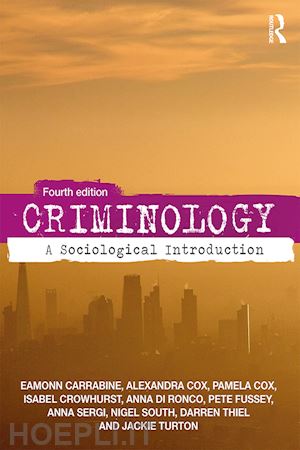Eamonn Carrabine is a professor of sociology at the University of Essex, where his teaching and research interests lie in the fields of criminology, cultural studies and sociology more generally. He has published prolifically in leading journals including the British Journal of Criminology, Criminology and Criminal Justice, Current Sociology, Deviant Behavior, The Howard Journal of Criminal Justice, Punishment and Society, Sociological Review, Sociology, Theoretical Criminology and Crime, Media, Culture. His books include Crime in Modern Britain (co-authored, 2002), Power, Discourse and Society: A Genealogy of the Strangeways Prison Riot (2004), Crime, Culture and the Media (2008) and Crime and Social Theory (2017). He currently co-edits the journal Crime, Media, Culture with Michele Brown (University of Tennessee) and they have recently edited the Routledge International Handbook of Visual Criminology (2017). With Avi Brisman (Eastern Kentucky University) and Nigel South (University of Essex) he has also co-edited the Routledge Companion to Criminological Theory and Concepts (2017). He was recently awarded a Leverhulme Trust Major Research Fellowship to research his project ‘The Iconography of Punishment: From Renaissance to Modernity’, which will be published as a book. Alexandra Cox is a lecturer in the Department of Sociology at the University of Essex. She previously served as an assistant professor of Sociology at SUNY New Paltz, where she ran the department’s concentration in criminology and was a Research Scholar in Law at Yale University Law School’s Justice Collaboratory. She received her PhD in Criminology from the University of Cambridge. Her book, Trapped in a Vice: the Consequences of Confinement for Young People, was published in 2018. She is a former Gates Cambridge scholar and a Soros Justice Advocacy fellow. Pamela Cox is a professor specialising in criminal justice history, social history and gender. She has worked as a youth justice and family justice consultant for UK local authorities and international NGOs. She has published recent articles in, amongst others, the British Journal of Criminology, History Workshop, Howard Journal and the Journal of Law and Society. Her books include Young Criminal Lives: Life Courses and Life Chances from 1850 (co-authored, 2017), Bad Girls in Britain: Gender, Justice and Welfare, 1900–1950 (2012/2003) and Becoming Delinquent: European Youth, 1650–1950 (co-edited, 2002). She is currently leading an interdisciplinary ESRC project on victims’ access to justice in English criminal courts over three centuries. Isabel Crowhurst is a senior lecturer, and her main research is concerned with the construction and socio-legal treatment of non-normative sexual practices and intimate lives, and how they are negotiated and made sense of in everyday lived experiences. Recent books include the Routledge International Handbook of Sex Industry Research (co-edited, 2018), Sexualities Research: Critical Interjections, Diverse Methodologies and Practical Applications (co-edited, 2017), and The Tenacity of the Couple Norm (co-authored, forthcoming). Anna Di Ronco is a lecturer in criminology at the Sociology Department of the University of Essex. Her research interests lie in the regulation, representation and enforcement of ‘anti-social behaviour’, and in individual’s resistance to social control in physical and digital space. She has published her research widely in leading criminology journals, including The European Journal of Criminology, Criminology & Criminal Justice, Crime, Law & Social Change, Crime, Media & Culture, and The International Journal of Crime, Law and Justice. Her more recent projects look into the local collaborative governance of prostitution in European cities, and into the role of social media in supporting (otherwise criminalised or silenced) activism – particularly environmental activism. She is also currently co-editing a book on medical misinformation and social harm in non-science based health practices, which will be published in 2019. Pete Fussey is a professor of sociology in the Department of Sociology at the University of Essex. Professor Fussey’s main research interests focus on surveillance, digital sociology, human rights, control and the city, and he has published widely across these areas. He is a director of the Centre for Research into Information, Surveillance and Privacy (CRISP), and research director for a five-year large-scale ESRC project analysing the human rights implications of emerging technology, with particular focus on digital policing and surveillance practices in the US, UK, Brazil, Germany and India. His other work focuses on organised crime in the EU with particular reference to the trafficking of children for criminal exploitation (a monograph - Child Trafficking in the EU: Policing and Protecting Europe’s Most Vulnerable published in 2017). Professor Fussey has also worked with and advised national a











